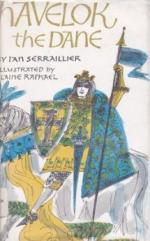Well pleased was Alsi the king with somewhat, men said in the morning.
But there was one who rose heavy and sorely troubled, and that was the Lady Goldberga, for all the fancies that had been brought to her by the vision had come to nothing, or worse than nothing, as she looked on Havelok and saw in the cook’s knave the very form of him of whom she had dreamed, and whom she could not forget. Glad had she been to go to her own chamber and away from the kindly ladies who could not know her real trouble; but not even to her old nurse did she tell what that was. Her one thought now was to seek someone who was skilful in the reading of dreams, and so find some new hope from it all. But no one could tell her of such a one here, unless it were to be a priest of Woden, and that she would not hear of.
Then, early in the morning, Alsi sent for her, saying that he would speak with her alone for a while. So she went to him, where he sat in the chamber beyond the high place; and he greeted her kindly, asking after her rest, and saying that he hoped that the sudden faintness had hurt her not. Then he led her to a seat, and bade her rest while he talked of state affairs.
“For it must be known to you, my niece, that the Witan thinks it time that you should take your father’s kingdom.”
Now Goldberga knew that, and had long made up her mind that when the time came she would not shrink from the burden of the crown.
It may well have been that Alsi thought that she would wish to wait for a time yet, for he did not seem altogether pleased when she answered, “If the Witan thinks right, I am ready.”
“But,” he said, “there is one thing to come before that. The Witan must know who your husband shall be. And that is reasonable, for he will have a share in ruling the kingdom.”
Then said Goldberga, “They need have no fear in that matter, for I will wed none but a king or the heir of a king.”
“Well,” said Alsi, dryly enough, “they are not so plentiful as are blackberries, and there may be two words to that.”
“I am not anxious to be wedded,” answered the princess, “and I can wait. It is, as you say, a matter that is much to the country.”
Then Alsi tried another plan, seeing that Goldberga was not at all put out by this. So he forced a cunning smile that was meant to be pleasant, and said, “I had thought that your mind ran somewhat on Ragnar.”
He looked to see the lady change colour, but she did not.
“Ragnar is my cousin,” she said, “or a good brother to me, if you will. Moreover, until the other day when he met me in London by some good fortune, I had hardly seen him since my father died.”
“What think you of Griffin?”
“Nothing at all, for nidring he is,” answered Goldberga with curling lip.
Now that angered Alsi, for he had so much to do with that business; and if Griffin was to be called thus by his fault, he was likely to lose a friend.




